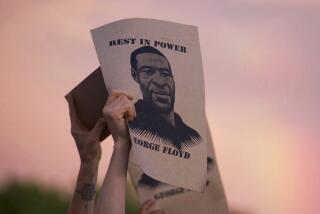Lost Moment for South Africa
- Share via
The whole point of South Africa’s Truth and Reconciliation Commission was to arrive at the truth, to assess responsibility for past deeds, good and bad. Winnie Madikizela-Mandela had her chance and, regrettably, she missed it. A last-minute admission that “things went horribly wrong” is not enough.
She could have used the privileged podium of the commission to remind people how tough it was to help organize the struggle to end apartheid while the leader of the movement, her husband, was locked up in jail. She could have come forward and admitted from the heart that the wrongs occurred because, among other things, her judgment failed; the victim became the victimizer.
The Truth and Reconciliation Commission was created in an attempt to heal a nation bloodied after years of racial hatred and political strife. Thousands were killed in a spiral of massacres, bombings and assassinations in the final decade of white rule. Among the elements exposed at the hearings was a band of white security officers who committed atrocities.
When Winnie Mandela spoke last week before that government commission, the people wanted to hear what was on her mind when she allegedly ordered or allowed the infamous Mandela United Football Club, the group of thugs she commanded, to kill teenage activist Stompie Seipi, Soweto physician Abu Baker Asvat and others. She was earlier convicted of instigating the murder of Seipi and was merely fined. She had a chance before the commission to speak, with almost no fear of additional prosecution, after hearing 30 witnesses make accusations. But she did not.
Madikizela-Mandela took her title as Mother of the Nation at a time when there was no justice for her imprisoned husband, no safe outlet for legitimate protest against the evils of legalized racism. But she was not leading the fight against apartheid alone. There were times when she seemed to confuse praise for the struggle with praise for self; when she thought she was above the needs of an organized freedom movement.
Revolutionary struggles need to be understood in all of their complexities, their failures as well as their victories. Madikizela-Mandela needs to step forward again and tell the whole truth. The divisions that have existed, between blacks and whites as well as among blacks, need healing. Without the whole truth, reconciliation will be elusive.
More to Read
Sign up for Essential California
The most important California stories and recommendations in your inbox every morning.
You may occasionally receive promotional content from the Los Angeles Times.













